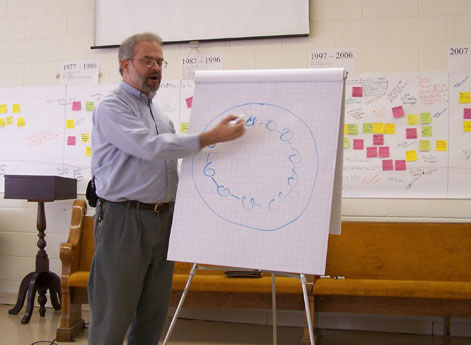Theological field education helps you, the student, build many important habits, not the least of which is ministerial reflection. Reflective practices make you more effective in leading faith communities. Ministers who build patterns of contemplation learn to listen carefully to the words expressed by congregants during significant ministerial moments. Yet you also will find that ministerial observation goes far beyond listening to words. As you build habits of reflection, you will become more attuned to the multiple meanings embedded in situations and to the layers of interpretation you might make about an incident. Field education works to develop more than habits of meditation; its goal is to enable you to integrate multiple types of reflection into a coherent framework. That integrative process enables you to form an interpretation so that you can help congregations act upon their deepest callings from the gospel. Then you will learn, after acting, to reflect again on what you have done, to consider next steps toward faithful ministry.
Ministerial reflection might at first appear to be an extravagant way to spend time, like the weekend at a spa far removed from the important work to which you are called. It would be understandable if you were to perceive ministerial reflection as a time-out from the real work of ministry, such as visiting those in prison or writing a liturgical prayer. Instead, however, ministerial reflection is the crucial key to all of the work of ministry. For only through careful consideration can you put together pieces that otherwise seem disjointed, irrelevant, or confusing. Reflection enables you to weave the integrative thread that you then will offer to the community as its members weave the tapestry of God’s missional purpose in its midst.
Consider Rachel’s experience in her field education congregation. While the minister and Rachel’s supervisor, Cassandra, is out of town, a beloved two-year-old child of key members in the church dies, tragically, by drowning in the backyard pool. The minister will return from her out-of-town trip as soon as possible to do this funeral, with Rachel assisting her along the way. But in the meantime, Rachel goes to visit the family in their grief. Here are some of her reflections as she drives back to the church after her meeting with the family in their home:
I wonder if I said the right things to them, or at least did not harm them with what I said. I never knew that Charles and Susanna’s marriage was about to fail, and now it seems unlikely to survive, especially since Susanna blames Charles’s drinking for his neglect of their daughter. Is it really his fault? Is his drinking bad enough that he might harm other family members? How will this death and their failing marriage affect the deacons’ retreat next month, since Charles is on the deacons’ committee? Does anyone else know about his drinking? And what about their older child, Stephen? He was awfully silent during our time together. What’s going on there? He reminds me of my brother and how he used to close up when our family started to argue.
Rachel will reflect many times on that situation throughout her time in field education. Her ruminations about the situation will prove crucial to her formation as an effective minister and will influence her theological perspective, her capacity to engage in difficult situations, and her compassion for the people with whom she engages ministry. Her reflections will take place as an inner conversation, with her supervisor for field education, and, hopefully, in the context of peer conversations and in several classroom settings. These considerations help her develop her capacity for counseling, funeral planning, and prayerful intervention in a troubled family situation.
Field education, at its best, will teach Rachel a number of skills such as those listed above. Certainly, she needs to learn how to talk with people who are grieving and how to inform such a conversation with the resources of faith. She will also learn how to do a funeral for a grief-filled family and community that attends to their broken hearts and their faith-related questions. The central purpose of field education is to remind Rachel that she must pay attention to something beyond the tasks related to this ministerial situation. She also must learn to slow down her thinking process while on that drive home and capture the multiple layers of reflection she needs to engage to fully understand and interpret what is happening in the many lives affected by this tragic turn of events. And she must learn that one of those lives affected is her own.
Rachel needs to explore many things to fully understand what is happening in this moment of ministry. Why is her leading concern during her inner conversation on the drive home about what she says or does not say? What does that tell her about herself and her assumptions about what would and would not be helpful in any situation? Next, she may want to consider how much she knows about marital stress and how these types of major life incidents can affect marital relationships. She also might want to learn what she can about alcoholism and its effects on family dynamics. If she truly suspects that Charles’s drinking may be putting remaining family members at risk, she may have legal responsibility to follow through on those suspicions.
In addition to these types of deliberations, Rachel will want to think about the church as an organization, including events like deacons’ retreats and meetings, and how these too are affected by significant life upsets such as the tragic death of a child or the untreated alcoholism of a committee member. She will want to begin thinking about how the core teachings of her church about God’s presence in times of loss will best be upheld in the days ahead. She will want to think about the faith questions that will arise, including whether or not this was God’s plan or judgment, or whether it is “just a twist of fate.” She needs to listen to all sorts of interpretations that members of the congregation will offer for what has happened and interpret the situation from a theological point of view. Finally, she may want to reflect on the challenge of thinking about her own family while being engaged in ministry to another family. She will want to learn how to ponder the assumptions she makes about other families because of the dynamics at work in her own.
Many students today come to seminaries and divinity schools during their third decade of life. Some are keenly aware of their own limited life experience. So when they encounter a situation like the one Rachel suddenly finds herself in, they can wonder, what do I have to offer? It might even be the first time they have actually experienced the death of someone they know. Ministerial reflection can serve to boost a student’s ability to function outside of comfort zones with a degree of appropriate confidence that he or she can indeed offer something of real value to those in need. Reflective ministers bring more than skills to situations; they also bring a capacity to help individuals in challenging situations build perspectives that integrate and honor their faith. While ministers build this capacity over the entire span of their professional lives, young and relatively inexperienced ministers can offer just as compassionate and effective care as can those with longer resumes. And they will learn to develop their reflective capacity throughout their professional lives.
If you enjoyed this article, we encourage you to explore all of Welcome to Theological Field Education!, on sale this week for 30% off the list price.
Comments welcome on the Alban Roundtable blog
__________________________________________________________
Adapted from Welcome to Theological Field Education! edited by Matthew Floding, copyright © 2010 by the Alban Institute. All rights reserved.
__________________________________________________________
FEATURED RESOURCES
 Welcome to Theological Field Education!
Welcome to Theological Field Education!
Edited by Matthew Floding
Field education is an opportunity for students to develop ministry skills, practice ministerial reflection, discern their call, experience professional collegiality, and undergo personal transformation. Field education offers them a place to practice ministry and a space to reflect on it, to integrate theory and practice, and grow towards competency. In Welcome to Theological Field Education! eleven directors of field education in seminaries and divinity schools across North America pass on their wisdom to both students and their supervisors.
 Shaping Spiritual Leaders: Supervision and Formation in Congregations
Shaping Spiritual Leaders: Supervision and Formation in Congregations
by Abigail Johnson
Recognizing that supervision is important in the formation of lay leaders and in the life of candidates for ordination, Johnson has developed this book to guide all who supervise others in a congregation. She views supervision as a ministry and shows how leaders can use their own innate gifts to enhance their supervision skills. Supervision can become an opportunity for mutual growth and learning that strengthens all other areas of ministry.
 The Competent Pastor: Skills and Self-Knowledge for Serving Well
The Competent Pastor: Skills and Self-Knowledge for Serving Well
by Ronald D. Sisk
Competence in ministry is a moving target. A ministry technique that works in one parish may not work in another. What works today may not work five years from now. But a competent pastor will be able to adapt to changing locations and changing times. This book is intended to help pastors, seminarians, and lay people who work with pastors understand themselves and others and to keep a realistic perspective on their work and their lives .
 Reflecting with God: Connecting Faith and Daily Life in Small Groups
Reflecting with God: Connecting Faith and Daily Life in Small Groups
by Abigail Johnson
Abigail Johnson offers a structured process for engaging in theological reflection by looking at a situation or event through a series of questions that are designed to help individuals and small groups to think through situations with the eyes of faith. She provides detailed instructions for group facilitators, making this book a valuable resource for any theological reflection leader.
__________________________________________________________
ALBAN CONSULTING: WE CAN HELP
 Taking a fresh look at the community you serve? * Dealing with decline? * Considering reorganizing your staff? * Growing? * Experiencing escalating conflict? * Thinking about sharing ministry or merging with a neighboring congregation? * Stuck in endless rounds of unproductive meetings?
Taking a fresh look at the community you serve? * Dealing with decline? * Considering reorganizing your staff? * Growing? * Experiencing escalating conflict? * Thinking about sharing ministry or merging with a neighboring congregation? * Stuck in endless rounds of unproductive meetings?
THESE SITUATIONS, AND MANY OTHERS, ARE CHALLENGING AND CAN BE DAUNTING.
AN EXPERIENCED GUIDE CAN WALK WITH YOU, SHARE IDEAS AND INSIGHTS, AND HELP YOU FIND YOUR WAY.
Call us, email us.
Let’s talk about how we might help.
1-800-486-1318, Ext. 283
__________________________________________________________
Copyright © 2011, the Alban Institute. All rights reserved. We encourage you to share articles from the Alban Weekly with your congregation. We gladly allow permission to reprint articles from the Alban Weekly for one-time use by congregations and their leaders when the material is offered free of charge. All we ask is that you write to us at alban@div.duke.edu and let us know how the Alban Weekly is making an impact in your congregation. If you would like to use any other Alban material, or if your intended use of the Alban Weekly does not fall within this scope, please complete our reprint permission request form.
Subscribe to the Alban Weekly.
Archive of past issues of the Alban Weekly.
